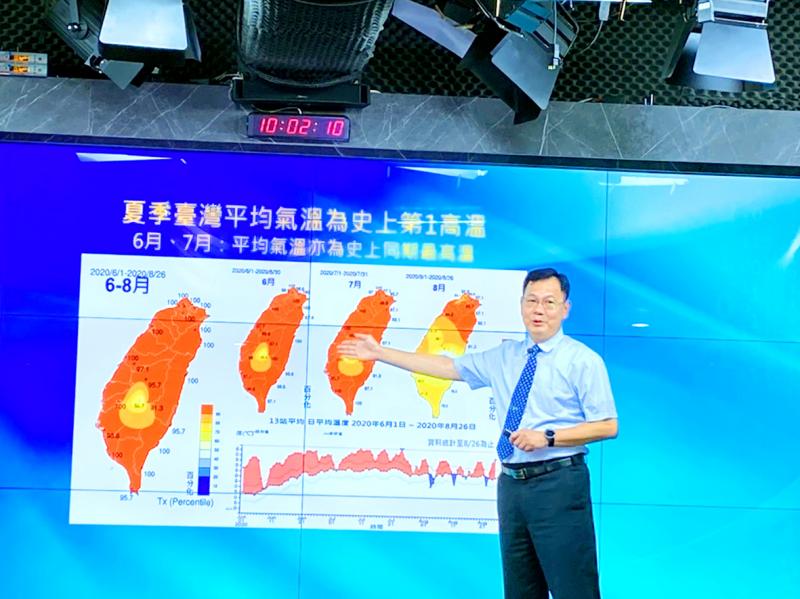This summer has been the hottest ever recorded in Taiwan, with several monitoring stations having reported record temperatures, the Central Weather Bureau (CWB) said yesterday.
This summer arrived earlier and has been warmer than past summers, with the average temperature from June to Wednesday reaching a record 29.54°C, Weather Forecast Center Director Lu Kuo-chen (呂國臣) said.
Previous records were 29.41°C from July to September last year, 29.38°C from July to September 2014, 29.16°C from June to August 2016 and 28.99°C from June to August 2017, he said.

Photo: CNA
Several weather monitoring stations have recorded the highest temperatures ever, including 40.2°C in Taitung County’s Dawu Township (大武), 39.7°C in Taipei and 23.8°C at Yushan National Park, where the bureau’s station is at an altitude of 3,858m.
In Taipei, there were 72 days in June and last month when temperatures exceeded 35°C, 55 days when temperatures exceeded 36°C, 30 days when temperatures exceeded 37°C, 13 days when temperatures exceeded 38°C, and two days when temperatures exceeded 39°C, bureau data showed.
Average rainfall this summer dropped 50 percent compared with past summers, although this month has had greater rainfall, Lu said.
The first eight months of this year has had the least rainfall since 1993, he added, urging people to conserve water.
An unusually strong subtropical high-pressure system caused the plum rain season to end earlier than usual, the bureau said.
This month, six typhoons have formed in the Pacific Ocean — more than the monthly average of 5.6 — but their effect on Taiwan was limited, the bureau said, adding that they were weaker because they formed near land.
Lu forecast that rainfall would increase from next month to October, saying that warmer sea temperatures might produce more typhoons than normal this fall and winter.
In related news, the bureau said that Tropical Storm Maysak, which formed in waters east of the Philippines yesterday, is not likely to have a major effect on Taiwan, although it is likely to bring rain to northern Taiwan on Monday afternoon and Tuesday morning.
Additional reporting by CNA

Taiwan has received more than US$70 million in royalties as of the end of last year from developing the F-16V jet as countries worldwide purchase or upgrade to this popular model, government and military officials said on Saturday. Taiwan funded the development of the F-16V jet and ended up the sole investor as other countries withdrew from the program. Now the F-16V is increasingly popular and countries must pay Taiwan a percentage in royalties when they purchase new F-16V aircraft or upgrade older F-16 models. The next five years are expected to be the peak for these royalties, with Taiwan potentially earning

STAY IN YOUR LANE: As the US and Israel attack Iran, the ministry has warned China not to overstep by including Taiwanese citizens in its evacuation orders The Ministry of Foreign Affairs (MOFA) yesterday rebuked a statement by China’s embassy in Israel that it would evacuate Taiwanese holders of Chinese travel documents from Israel amid the latter’s escalating conflict with Iran. Tensions have risen across the Middle East in the wake of US and Israeli airstrikes on Iran beginning Saturday. China subsequently issued an evacuation notice for its citizens. In a news release, the Chinese embassy in Israel said holders of “Taiwan compatriot permits (台胞證)” issued to Taiwanese nationals by Chinese authorities for travel to China — could register for evacuation to Egypt. In Taipei, the ministry yesterday said Taiwan

Taiwan is awaiting official notification from the US regarding the status of the Agreement on Reciprocal Trade (ART) after the US Supreme Court ruled US President Donald Trump's global tariffs unconstitutional. Speaking to reporters before a legislative hearing today, Premier Cho Jung-tai (卓榮泰) said that Taiwan's negotiation team remains focused on ensuring that the bilateral trade deal remains intact despite the legal challenge to Trump's tariff policy. "The US has pledged to notify its trade partners once the subsequent administrative and legal processes are finalized, and that certainly includes Taiwan," Cho said when asked about opposition parties’ doubts that the ART was

If China chose to invade Taiwan tomorrow, it would only have to sever three undersea fiber-optic cable clusters to cause a data blackout, Jason Hsu (許毓仁), a senior fellow at the Hudson Institute and former Chinese Nationalist Party (KMT) legislator, told a US security panel yesterday. In a Taiwan contingency, cable disruption would be one of the earliest preinvasion actions and the signal that escalation had begun, he said, adding that Taiwan’s current cable repair capabilities are insufficient. The US-China Economic and Security Review Commission (USCC) yesterday held a hearing on US-China Competition Under the Sea, with Hsu speaking on